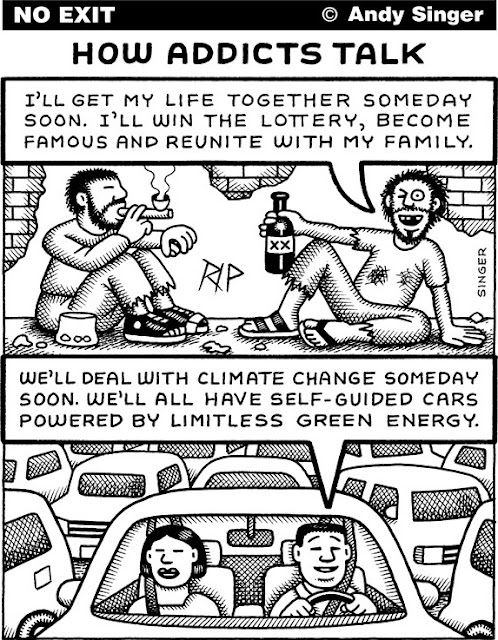A good opinion piece. On one end, the developed countries keep screaming that world keeps getting hotter & hotter, & the weather patterns keep getting drastic, which in turn, is throwing everything else out of whack; people's lives & their livelihoods are in severe danger. On the other hand, these same developed countries, while asking developing countries to not use fossil fuels, are using fossil fuels themselves, & have built an economic system, which is globalized, so it affects everyone around the world, & that economic system measures a country's development based on exploitation of earth's limited resources, esp. fossil fuels.
Companies of these developed countries get in contract with developing countries, where they exploit (dig up) these fossil fuels, without any regard to the climate change, due to them being cheaply available, & then export these products around the world & make a handsome profit. All the while, the developing countries, might be showing a good GDP & a positive Current Account figure, but they are also suffering due to those fossil fuels being used abundantly & adversely affecting the climate around the world. Their public is far susceptible to fighting each other for limited amount of healthy food, clean water, & clean air, & in absence of these items, these developing countries are also bear the responsibility of adverse health conditions of their public, due to unavailability of basic necessities of life.
As the author correctly suggests, the world economic system needs to separate itself from this usage & exploitation of fossil fuels. Countries should be measuring exports & current accounts based on export of solar & wind-generated energy, instead of oil & coal, & this change needs to happen now, because we have already crossed the red line, & in some places, weather patterns have drastically changed. Remember, today, it's them; tomorrow, it'll be us, fighting for healthy & clean food, clean water, & clean air.
-----------------------------------------------------------------------------
Climate change intensifies conflicts and creates mass migrations. Tens of millions of people are displaced owing to climate change, according to the United Nations. Severe droughts and heatwaves in Syria and the Middle East at large preceded the war, leaving people without jobs, food or hope - and migrating for their lives.
...
...
Climate change is a result of the Bretton Woods institutions and their deliberate policy to globalise the world economy based on extensive exports of natural resources from poor nations. This means petroleum, coal and gas, minerals, metals, forest products and meat.
Since their creation in 1945, the World Bank, the International Monetary Fund, and the World Trade Organization have been based on hyper-exploitation of natural resources that they encouraged and even coerced from poor nations.
Low prices of natural resources have contributed a several fold increase in the wealth gap between the poor and the rich nations since World War II. This was the most successful period of industrialisation the world ever saw. It was based on extensive overconsumption of natural resources, and the direct result is climate change.
...
...
Almost a decade ago, the UN warned that "indigenous people are among the first to face the direct consequences of climate change owning their dependence upon, and close relationship with the environment and its resources." ...
Water is now one of the scarcest resources globally, according to the UN. The story is the same around the entire developing world.
What to do?
We need to replace the Bretton Woods system. They were the first global financial institutions the world ever saw. They fulfilled their mission and now they are dragging the world into an environmental disaster.
New global financial institutions are needed to get things right. We need to limit the exploitation of the planet's atmosphere, its bodies of water and its biodiversity. These are basic needs for human survival: we need clean water, clean air and food without which we cannot survive. All this is possible and must be done.
The limits on resource use can be flexible over time with the creation of equitable and efficient global markets for the global commons.
Limits on the use of water, air and biodiversity is what humanity needs to survive. This parallels the limits on emission of CO2 nation by nation, which was achieved by the Kyoto Protocol in 1997 and its carbon market that became international law in 2005.
...
...
The recent Paris Agreement - which has no emission limits and no teeth - must be improved. The establishment of a new system that respects our planets' vital resources for life will change the global capitalistic system - as they value the global commons, clean air, clean water and biodiversity. These have no economic value today, but it can be and should be done.
We need to decouple economic progress from fossil fuels if we are to survive as a species. The International Energy Agency recently reported that this is already starting. A detailed footprint and the attendant economic policies must redress economic growth to be harmonious with the world's resources and with the survival of humankind.
Graciela Chichilnisky is a professor of economics and of statistics at Columbia University and the Director of the Columbia Consortium for Risk Management.







